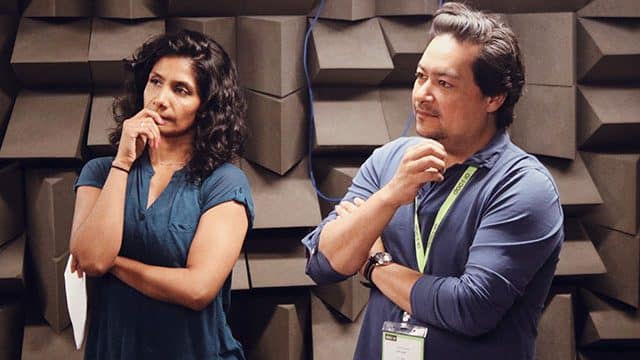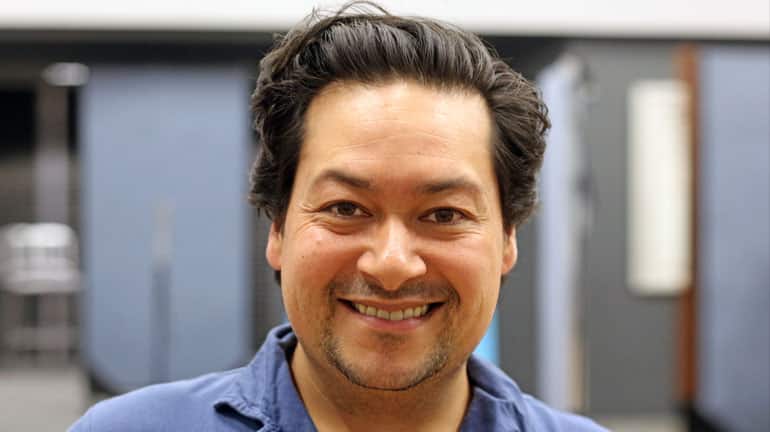Nick Ahad is a writer, comedian and journalist who hosts Little Nick’s Big Show on BBC Radio Leeds.
He’s also responsible for authoring Partition – a co-production between BBC Radio Leeds and Leeds Playhouse which explores the impact and shockwaves of the division of India in 1947.
Last year Entertainment Focus called the play “a remarkable study of healing and forgiveness, exploring horrors which shouldn’t be forgotten, whilst offering much optimism for the future.”
We catch up with Nick as Partition returns to Leeds Playhouse prior to a tour of schools across Yorkshire.
So Nick, when did you start writing drama?
Back in 2009 I applied for a new writing course at the then West Yorkshire Playhouse. To cut a long story short, they selected half of the group to develop and I wasn’t in that half. It was disheartening, but when somebody says you can’t do something or you’re not good enough, I just become more determined.
Within a couple of months, I got onto another writing course with Peshkar Productions based in Oldham. At the end of that course, I was commissioned to write my first play. It was a co-production with Red Ladder Theatre called Nor Any Drop and it toured schools across Lancashire and Yorkshire in 2010.
Now one of your latest plays is set to tour schools again. Tell us about how Partition came to be.
By this point it was about 2016. I’d been writing for Emmerdale for a couple of years and I’d had a few plays produced. People at BBC Radio Leeds knew I was a playwright and Sanjiv Buttoo, Managing Editor at BBC Radio Leeds, asked me to write something for the centenary of the Battle of the Somme. That went really well and he wanted to do something to mark the 70th anniversary of the partition of India.
Because we’d worked together as playwright:commissioner previously, he asked me if I had any ideas. I felt that the partition was a really important subject – one we’re not taught very much at school.
It’s a piece of history I know something about, because of my background being half Bangladeshi and it speaking to my heritage. The divisions of India and religion still have an impact on British Asians living today. That’s one of the big reasons I wanted to write the story.
You were aware of today’s impact, but did you have to further your historical knowledge?
I knew a bit. Probably more than most who experienced a typical English school education – who wouldn’t necessarily know about partition.
Because I’ve grown up half Asian, and because at University a lot of my friends were Asian, I had diverse relationships with people who were from Indian backgrounds; one of my best friends was a Sikh, another good friend was from a Pakistani Muslim background. So I knew about the tensions that existed as the result of partition.
But I did do a huge amount of research. I spent longer researching this play than anything else I’ve written, and I learnt so much. It was fascinating to hear about what happened, but it was also horrifying. Aspects such as the mismanagement of the partition were new to me, and the personalities of Cyril Radcliffe, Lord Mountbatten, Jinnah and Nehru.
Was it a challenge to develop that research into a story?
It was a huge challenge, to be honest. The thing I’d written previously was quite history-based and initially, Sanjiv who’d commissioned it, again wanted something which was historical. I could have written something which featured Nehru, Mountbatten and Jinnah in a room – because that’s a really interesting moment at the point of negotiations as to where the country was to be split.
But that kind of historical drama didn’t feel pertinent to today and a lot of my writing is about the contemporary British Asian experience. That’s something that’s important to talk about and it’s something I often explore. So I realised very quickly that if I tried to tell the history in 45 minutes, all I could do was fail.
If I could tell a real human story, looking at how history impacts on lives today, then I felt I gave myself a better chance of success.

You wrote Partition primarily as an audio drama. What did that offer above a traditional stage play?
It was really interesting when the Playhouse came on board, because there were discussions initially of me writing a new script which would work on stage. Then we thought again because the beauty of this is that it’s a radio drama – it’s massively liberating because you can go anywhere. You can say we’re on the surface of the moon – you can take the audience anywhere. So we could go from the Town Hall to a kitchen in a flash.
The audience also fills in the blanks; their imagination is really important when writing for radio drama. So we thought, wouldn’t it be fascinating to present this live on stage and show the mechanics of how you make a radio drama; expose all the live foley effects and let the audience’s imagination do the rest. We decided to show the audience the nuts and bolts and reveal how we can transport them anywhere – which I thought was really exciting.
That’s quite a unique insight for an audience.
Yes it’s really interesting. In the first production, Darren Kuppan played a boy in his early twenties and a man in his eighties. I thought it was a brilliant performance and a few people in the audience said they enjoyed just closing their eyes in the theatre and listening to it like a radio drama.
For those who didn’t close their eyes, they got to see the actor transform himself. That’s because actors still physicalise the characters they’re playing during a radio performance. So we got to see the hidden techniques of the actors, which I think a lot of people found really joyful.
Balvinder Sopal has come back to play several characters and to see her flip from being a typically bossy Northern cafe owner to playing an Asian matriarch – literally switching between the two – is so much fun for the audience to watch.
It’s a surprise for those who hear the radio broadcast first, then see it realised with such a small cast.
Yes, exactly! I think there’s something like thirteen characters and only four actors. That’s quite a demand on those performers and we’ve been really lucky with our cast. I think it’s a real joy for them to show off what they’re able to do too.
As Partition transfers into schools, what do you expect young people will take from the play?
What’s really exciting about this is that every single post-show discussion we did last year had at least one person say that we needed to take the production to schools. We were told that young people needed to see this.
We talked a lot about how partition isn’t taught on the curriculum, so I’m hoping that when we go into schools – which all the actors are really excited about – our students will get the chance to understand a vital period of British history which is difficult to understand.
We live in a multicultural society and one of the reasons why is because of what happened in 1947. It’s important to understand the history of our country, and for many young British Asians to understand their history and heritage.
The partition has cast a long shadow which still resonates today. Perhaps the play will help to educate and move us closer to resolving those issues?
I hope so. Our central story is about the tensions between a young Muslim woman and a young Sikh man – and those divisions still exist in our British Asian communities. The play seeks to understand how the actions of colonialism have led to modern day divisions across those communities.
Anything we can do to help heal those divisions – the more we can educate ourselves and the less ignorance we can have – the better it is for all.
Partition returns to Leeds Playhouse from Tuesday 6th to Saturday 10th November 2018, ahead of touring schools across the region. Book online at leedsplayhouse.org.uk or call the Box Office on 0113 213 7700.
Read our five-star review of last year’s performance of Partition.


